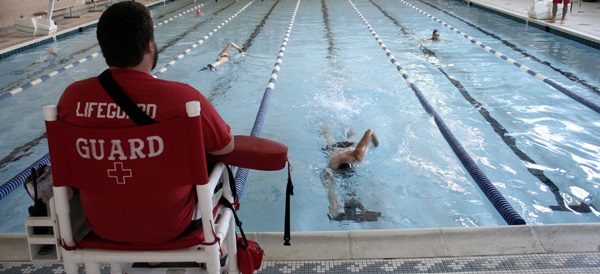Spring marks the time of year when the water starts to get warmer, the pool cover comes off and people of all ages begin to consider throwing their next party or event outdoors. Chances are that if you are reading this, you have already considered hiring a private lifeguard to supervise your friends and loved ones during your next water related gathering.
Party attendees and parents do not always have the ability to prevent drownings and pool related accidents for several reasons. Anyone who has ever hosted a bash for small children will tell you, a private lifeguard is essential.
Parents have too many obligations that make it impossible to devote their full attention to each individual all of the time, and it only takes a moment for someone to slip and fall in the pool. It is terrifying to consider that about 10 drowning (non-boating related) deaths occur per day in the United States, and 1 in 5 of those are children 14 or younger.
The majority of the most common causes of near-drowning typically apply to younger children but do not exclude adults. For children the inability to swim, panic in water and being unattended all apply. For adults the consumption of alcohol, concussion, seizure and heart attack are much more likely to contribute to in incident near a pool or body of water.
Lifeguards are trained to react fast. Typically a person will struggle on the surface 20 to 30 seconds before submersion occurs. After that it becomes far less likely that someone will notice them. That’s about how long it takes to pull out a few presents or cut a birthday cake.
Lifeguards are taught how to observe their environment without obstruction and to recognize signs of distress or panic. Actual death post-submersion can take as little as 3-4 minutes. This means that the time it takes to identify the victim, get to them, bring them above water and safely orient them all factor into saving a life.
No two injuries or accidents are ever the same. Lifeguards specialize in various forms of rescue that take into consideration proper steps to react to spinal injury, airway obstruction and head injury. CPR and first aid certification may be easy to obtain, but unless a person is trained and had some practice applying these methods to a rescue, precious moments can be lost that could factor into whether a person lives or not.
It is important to consider that when an emergency situation occurs the victim is not the only person to lose their cool. Part of lifeguard training prepares them to assess an emergency and control onlookers and concerned relatives so that too many people do not obstruct one another while providing assistance.
Most lifeguards have at least a few saves under their belt. At the very least, they are certified with basic necessary medical training and know exactly how their efforts will coincide with EMTs. Lifeguards know how to control their environment and remain calm in an emergency situation. So do yourself and your guests a favor, hire a private lifeguard for your next event.
Isabelle is a professional acquatics safety expert and blogger for E-Lifeguard On Duty

